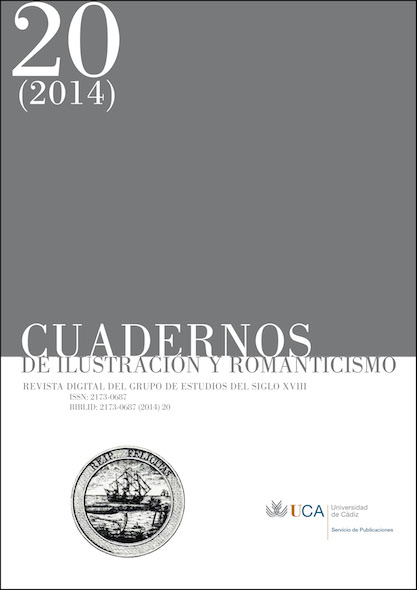No. 20 (2014): Backlit women: maids in the 18th and 19th century Spanish Literature
Presentation
-
Monographic section
-
Servants in Cordel literature, or maid as «Domestic enemy»
The maid becomes mistress. A Goldoni's topic in the Spanish theatre at 18th Century
The maid magician in the comedia de magia of the eighteenth century, or about female set designers and pedagogues in the sun set of the old regime
Let's blame the maid: stories of exemplarity and blame in eighteenth and nineteenth-century Spanish popular literature
The maid etopeya in the article of customs
Maids in the canonical realist novel, between slight and guile
Mediators of intimacy, negotiators of scandal: domestic in the end-of-century radical naturalist novel
Ideological and diegetic function of maids in novels by Júlio Dinis and Eça de Queirós: the cases of Antónia (Una familia inglesa) and Juliana (O primo Basílio)
Miscellany
-
Bengasi and low baroque poetics: prosaic, epistolary and jocoserious characters
Francisco de Paula Castañeda, amanuensis and author
Editions and Translations
-
Second theatre of Spanish Almanacks. (Excerpts of Torres Villarroel’s prognostications for the years 1719, 1722, 1723 and 1724, with their dedications, prologues, and inventions in verse and prose)
Notes
-
Book reviews
-
Vicente García de la Huerta, «Theatro Hespañol. Prólogo del colector». Edited and annotated by Jesús Cañas Murillo
Daniel Crespo Delgado, «Árboles para una capital. Árboles en el Madrid de la Ilustración»
María José García Folgado, «Los inicios de la gramática escolar en España (1768-1813). Una aproximación historiográfica»
Fr. Vicente Argüelles, «Receta instructiva y universalmente benéfica del nuevo invento del chocolate zamorense». Edited by Arsenio Dacosta et al
Antonio Calvo Maturana, «Cuando manden los que obedecen. La clase política e intelectual de la España preliberal (1780-1808)»
Juan Bautista Vilar and María José Vilar, «Mujeres, Iglesia y secularización. El Monasterio de Santa Clara la Real de Murcia en el tránsito de la Ilustración al Liberalismo (1788-1874)»
Gregorio Alonso, «La nación en capilla. Ciudadanía católica y cuestión religiosa en España (1793-1874)»
Rocío Plaza Orellana, «Los bailes españoles en Europa. El espectáculo de los bailes de España en el siglo XIX»
Juan Luis Simal, «Emigrados. España y el exilio internacional, 1814-1834»
José A. Valero, «Contagio sublime. Manuel José Quintana y el republicanismo clásico»
Luis Barbastro Gil, «El episcopado español y el alto clero en la Guerra de la Independencia (1808-1814). La huella del afrancesamiento»
-
-

